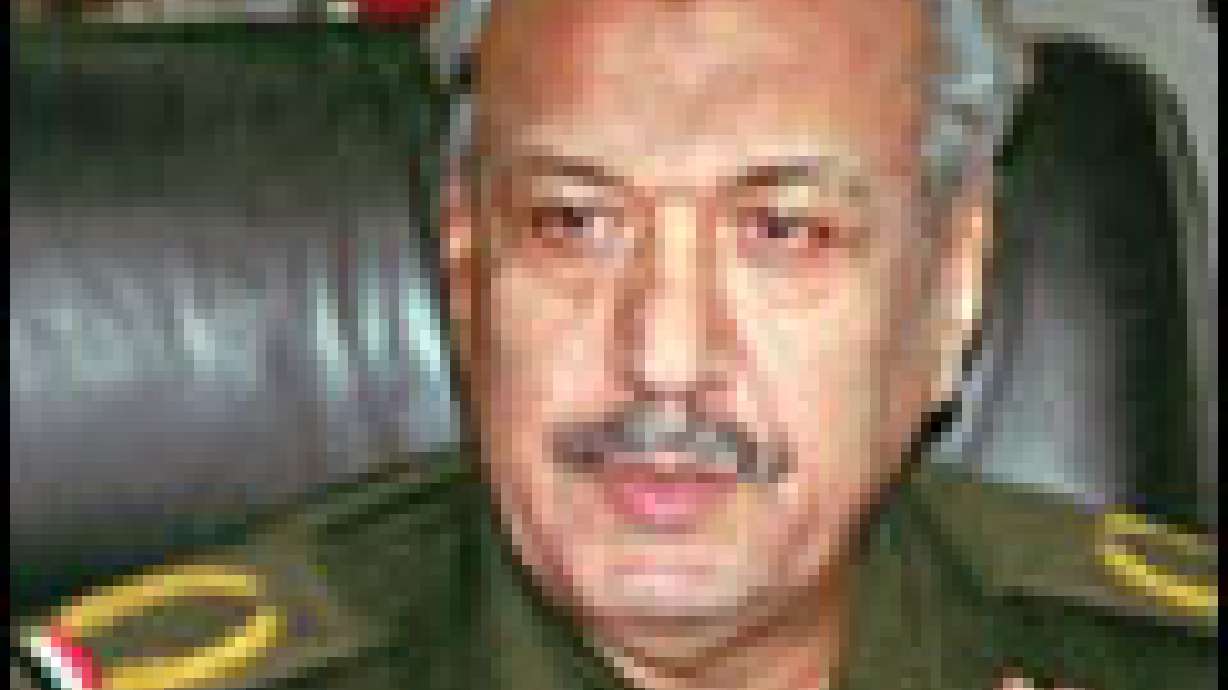Estimated read time: 4-5 minutes
This archived news story is available only for your personal, non-commercial use. Information in the story may be outdated or superseded by additional information. Reading or replaying the story in its archived form does not constitute a republication of the story.
BAGHDAD, Iraq (AP) - The country's newly revived police force was credited Saturday with nabbing Saddam Hussein's finance minister -- the first time authorities of the new Iraq arrested a top official of the old regime.
American forces touted the arrest of Hikmat Mizban Ibrahim al-Azzawi as an example of the Iraqi-U.S. cooperation for which they are striving.
News of the arrest came as Marines started turning Iraq's capital over to the Army, even as Baghdad still struggled to regain electricity _ and with it, telephones and water-purification systems.
But looting subsided enough to allow 50 U.N. trucks carrying flour to reach the city.
In Doha, Qatar, a U.S. Central Command spokesman, Marine Capt. Stewart Upton, said the arrest of al-Azzawi in Baghdad on Friday showed that the U.S. military's screening process for hiring police and getting them back to work was succeeding.
The new police, Upton said, "are going after regime leaders." And the United States says al-Azzawi could potentially provide important clues about where Saddam's regime has stashed its wealth.
"It's money for the people of Iraq, and we seek to have that for the building of the future of Iraq," Upton declared.
American officials hope to use Iraq's own wealth to rebuild the country; they are already drawing on $1.6 billion in Iraqi assets frozen in the United States to pay public servants who are returning to work.
They and any interim Iraqi authority also must begin to rebuild the financial infrastructure that al-Azzawi's ministry once commanded _ replacing the now-worthless "Saddam dinar" with a stable currency.
For some, dollars have long been the currency of choice. The Los Angeles Times reported Saturday that a patrol of the Army's 3rd Infantry Division came across some $650 million in U.S. currency in a Tigris River neighborhood where Baath party and Republican Guard officials lived.
U.S. forces say at least 400 Iraqi police returned to their posts last week under U.S. oversight _ a move welcomed by the officers and by Baghdad's people, horrified at the days of looting and burning that followed the toppling of Saddam.
Despite al-Azzawi's arrest, it remained unclear how significant a role U.S. forces were entrusting to Iraqi police. Fighting rampant bank robberies last week, U.S. Marines at times had to tackle Iraqi police stuffing cash down their pants or slinging bags of it into car trunks.
And Saturday, as Iraqi engineers labored to restore the city's key, Marine-guarded southern power plant, it was the U.S. Marines _ not Iraqi police _ who played traffic cop at the congested intersection leading into it.
When Iraqi traffic police encounter the jams going into the plant, "they're just sounding their sirens and going on through," a Marine said as he directed cars to stop and then move on.
Across the city Saturday, U.S. Marines packed their bags, slung their rifles over their shoulders and headed south in their Humvees, beginning the transfer of control of Baghdad to their Army counterparts.
Marines will work in southern cities before eventually making their way back across the border into Kuwait, toward home. Their parting tasks include picking up empty plastic food-rations packets discarded by many Marines on the road to Baghdad.
"I feel like it's kind of unfinished business ... we're leaving so fast," said Marine Staff Sgt. Jason Selby, handing over guardianship of a U.N. complex to soldiers of the Army's 3rd Infantry Division. "At the same time, though, we're looking forward to getting home."
Like the Marines, the 3rd Infantry Division fought its way into Baghdad two weeks ago.
Battle-weary forces taking over the city looked forward to handing off the job to the 4th Infantry Division and other units still working their way into the country, as soon as possible.
"We did the war part. We shouldn't have to do the peacekeeping part," said Army Specialist Clay Allison, a gunner during the war.
In southern Baghdad, a U.S. Army Humvee with mounted loudspeakers cruised around soliciting translators for the Army's government-building job.
"Go to the library if you speak English," the loudspeaker blared.
The announcer paused, adding, "Americans disregard."
For the first time in years, whiskey and beer _ banned in public by Saddam Hussein _ were being sold on the streets of Baghdad. Several merchants were selling whiskey by the bottle and beer by the can out of boxes on the street.
In recent years under Saddam, there were liquor shops and people could consume alcohol, but only in private.
Muslims are not supposed to consume alcohol, although it is accepted in some Islamic countries depending on religious interpretations. While Saddam's regime was secular, he occasionally cast himself as more religious when it was politically beneficial.
Iraqi power-plant managers had hoped to make Saturday the day they restored power and ended an outage that has paralyzed the city since just before American forces entered and created conditions perfect for looting.
Darkness fell with the city still in the dark, however. Authorities, speaking on condition of anonymity, said electric light was still as much as 48 hours away.
"No water, no electricity, no work, no medicine," said Ali Noor, a retired chemical engineer. "They come to help us? Where is the help?"
(Copyright 2003 The Associated Press. All rights reserved.)









